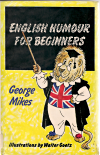

| Book of the Month | ||
 |
English Humour for Beginners |  |
Publisher: Andre Deutsch
Author: George Mikes
£7.60
ISBN 0-233-97296X
A well-known barrister (a kind of lawyer) once sat down after delivering a long and complicated argument to the court. The judge looked at him and said 'I have listened with careful attention to your argument, and I have to tell you I am no wiser.' The barrister stood up and replied politely 'Possibly not, my lord, but you are better informed.'
This is one of the many jokes scattered throughout this book, which is another attempt by Hungarian-born author George Mikes to explain the English to foreigners (and to themselves). In this book the writer looks at that strange phenomenon, British humour, and asks 'Does it exist? And is it, as the English believe, unique?' In the course of his investigation the author looks at different types of humour, from word play to nonsense poetry to dirty jokes (though the jokes in this book are all clean).
In fact the book is organized into two parts - theory and practice. Theory is the longest part, and takes up the first eighty-eight pages. Here the author asks things like 'What is humour?' and 'What is English'. His study of humour shows that he has thought and researched a lot on the subject, but like the judge in the joke above, the reader will probably end up better informed but no wiser. Things improve when Mikes gives his controversial opinion of the Scots - from a European viewpoint, the Scots are just Englishmen who very occasionally wear kilts. He then goes on to say that one of the main components of English humour is the ability of the English to laugh at themselves, and to joke about the mess the country is in. It is here that we discover that this book badly needs updating, because Mikes is writing about the Britain of a generation ago, and much has changed since. According to this book, the English laugh at their problems, and this gets in the way of doing something about them instead. His conclusion is that 'The English sense of humour is the most wonderful thing ... if Britain wants to survive as a leading industrial nation, it must get rid of it without delay.'
Who is this book for? This book will be very useful for anyone who has ever struggled with English jokes - for example, after receiving an Xmas card which says 'Noe' (explained below*). The book may not give many answers, but it is an amusing read. At least there will be some comfort in knowing that even Mr Mikes, after living in England a very long time, is still struggling with the English sense of humour. And the book gives a piece of very important advice. An Englishman might accept being called an idiot, a liar or an adulterer, but he will never forgive you if you say he has no sense of humour.
Verdict: Good jokes, tedious theory. A bit outdated.
Assessment 5/10
*'Noe' is 'Noel', but 'Noe' has no 'l'